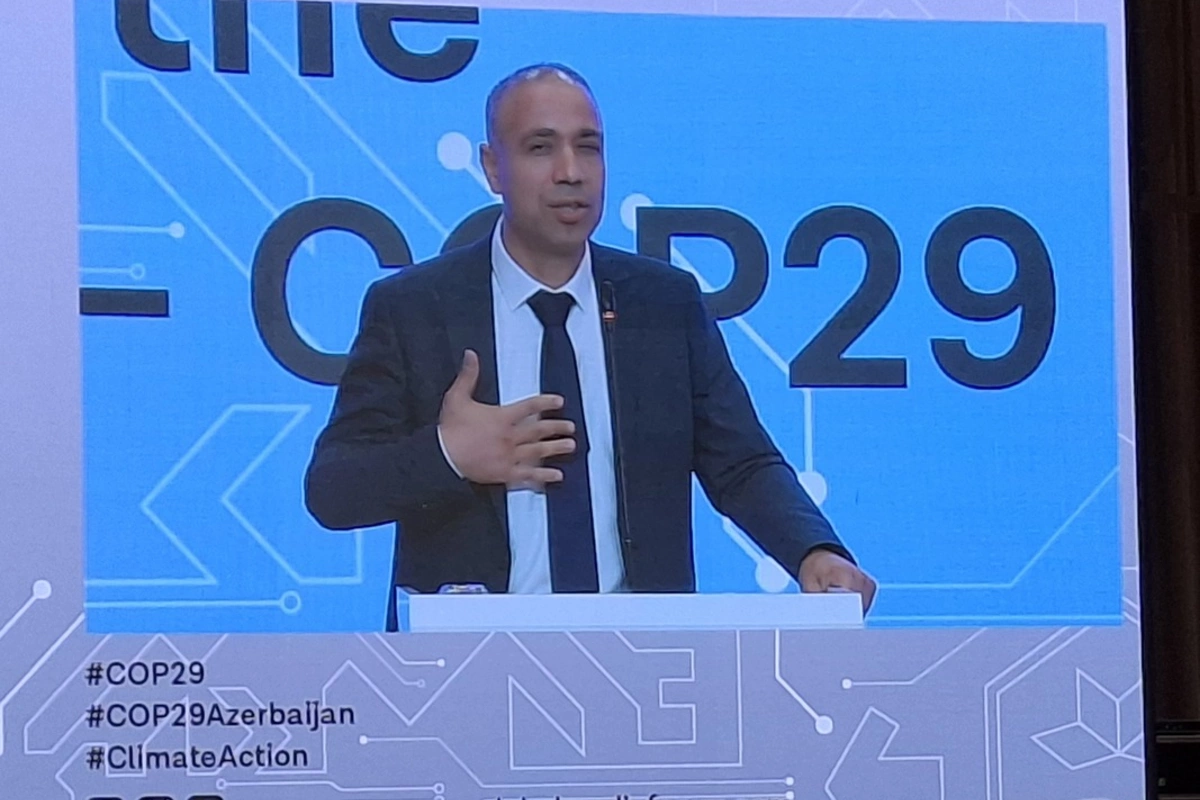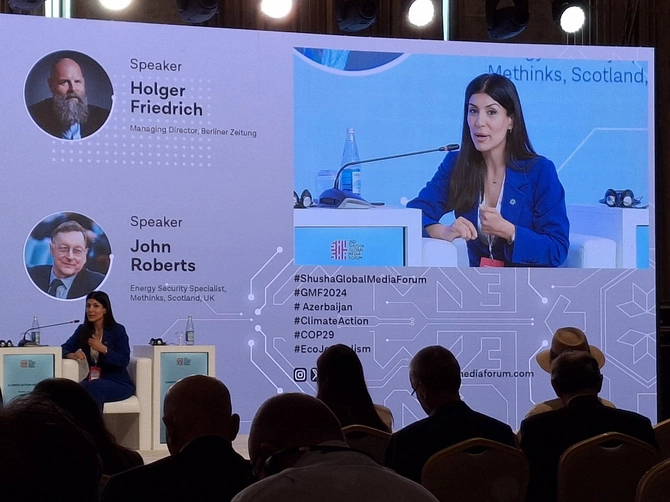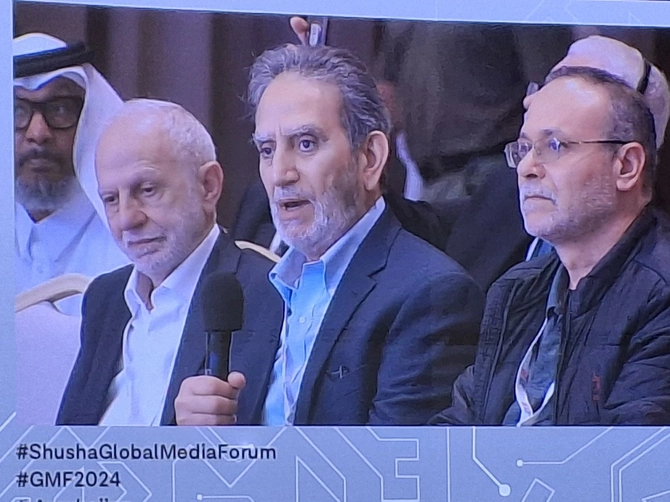
In November 2024, around 80,000 people, including 7,000 journalists, will arrive in Baku as part of COP29, the latest United Nations Climate Change Conference. How ready is the country for the global media spotlight?
Image: The Caspian Post
This weekend (July 20-22), journalists from 50 countries attended the annual Shusha Global Media Forum. Its 2024 headline theme was "Unmasking False Narratives: Confronting Disinformation," with the final day mostly dedicated to how such issues affect ‘green’ politics. These sessions proved to offer a very fruitful series of insights into Azerbaijan’s imminent hosting of COP29, with journalists keen to probe as to how well-advanced are Baku’s preparations, notably Azerbaijan’s readiness to deal with the inevitable series of ecological, environmental, and political questions that are associated with leading COP.
On the Forum’s opening day, President Ilham Aliyev had already devoted considerable attention to the issues of sustainable energy and how hosting COP would put Azerbaijan into the ‘top league’ in terms of event management. He welcomed the prospect of global attention, following hot on the heels of Baku’s role heading the Non-Aligned Movement. Mr. Aliyev cogently explained that there was no paradox in promoting green solutions from a country whose economy is overwhelmingly based on hydrocarbon production. He outlined in considerable detail the very practical efforts being made to develop solar and wind power generation facilities in Azerbaijan, including plans for rapidly improving connectivity to better distribute its ‘clean electricity’ as far afield as Romania. However, he recognized that getting clear sustainability messages across would take a great deal of work, having noted the very considerable flack faced by the UAE when Dubai hosted COP 28. Headlines like “Why is COP28 being held in the oil-rich United Arab Emirates?” suggested that petrodollars were hijacking the agenda and that greenwashing must be the reason why a hydrocarbon-producing nation would turn COP host. Such attitudes, suggested Aliyev, are indicative of bias against non-Western nations given that such questions were not aimed against Scotland (also an oil producer) when Glasgow hosted COP26.
On Sunday, COP29 ‘Champion’ Nigar Arpadarai, an Azerbaijani member of parliament and former Baku Grand Prix press officer, gave a very fluent analysis of Azerbaijan’s take on the COP process, which, she underlined, is indeed a process, not just a short event. To ensure continuity, Azerbaijan has been working as a troika with the UAE (COP28) and Brazil (COP30), and by the time of the conference itself, a great deal of the real work should have been done. Taking on board the complexity of the whole raft of underlying issues, Ms. Arpadarai accepted that it will be necessary to simplify things somewhat to present a clear directional goal for Azerbaijan’s stint as COP president. This focus will be climate finance—hoping to create a truly inclusive environment within which bridges can be forged between business, society, SMEs, NGOs, etc.

“COP is not just an event but a process: our presidency lasts much longer than the meetings” – Nigar Arpadarai. Image: The Caspian Post
Elnur Soltanov, COP29 CEO and Azerbaijan’s Deputy Minister of Energy, whose PhD was in International Relations, was frank in facing the challenges ahead, noting that cooperation between sovereign states collective very rarely works, but that forging a sense of common identity and purpose is the one hope of getting us out of the “prisoner dilemma." Civil society had pushed the world’s leaders to take notice of the climate emergency with the 1992 UNFCCC and remained a powerful driver, but “now we need to bring in powerful economic forces that will take things over the line through self-interest.”
Among his detailed explanations of the financial hurdles ahead, Mr. Soltanov highlighted the need for a more efficient way to price carbon credits, notably pushing for “high integrity” credits. Apparently, in the current situation, much of the carbon market had become ‘bogus'—a way of buying rights to pollute without ensuring actual real-world investment in mitigation efforts with the money raised. This needs to be reworked, and the system needs to make sense to ordinary people—i.e., that a carbon credit really does equate to a certain number of trees planted.
Other priorities for COP29 include operationalizing Article 6 (settling three clauses left unfinished at COP28) and moving the Loss & Damage Fund from a nominally pledged US$0.8 billion to a sustainably funded budget that comes far closer to the trillions of dollars required for serious action. Asked whether a Trump victory in upcoming US elections would derail the whole global green agenda, Mr. Soltanov suggested that things had “gone too far” for even a US withdrawal to stop the global move towards climate targets—notably because US corporations have vested interests in the big business of green changes.
Berliner Zeitung’s tech-millionaire owner, Holger Friedrich, stressed that the complexity of the issues makes it hard for media to focus an understandable message and that what is needed is an educational game. Latvian moderator Ansis Bogustovs from Riga TV24 added further well-targeted series of questions, echoing the worry that such complexity made it too hard for journalists to present their readers with sufficiently nuanced copy. It would be all too likely, he suggested, that the need for gripping headlines would lead correspondents to focus on comparative trivialities: the inevitable disturbances from pressure groups, unexpected departures by specific nations, or publicity stunts by anti-hyrdrocarbon pressure groups. Such stories would very likely grab public attention over and above the important but unsexy nitty-gritty of financial tools for funding mechanisms.
Al Jazeera’s director, Mostefa Souag, begged to differ, underscoring that for his news organization, the issue of sustainability was one of constant attention, not just during COP, such that he was confident that a well-trained team would be able to provide suitable nuance.

Mostefa Suag, director of Al Jazeera spoke from the floor. Image: The Caspian Post
Veteran oil journalist Frank Kane, for whom Baku will be his 4th COP, warned the organizers to be prepared for an unprecedented level of ignorance and prejudice both against oil and against Azerbaijan itself: “They will attack you on perceived corruption, human rights, and geopolitics—the myth of Azerbaijan aggression,” whether deliberate disinformation or simply because some journalists fail to appreciate that the 2020 Second Karabakh War was one of Azerbaijan reasserting the UN status quo rather than an unprovoked attack on Armenia.
In defence of journalists, however, he reminded listeners that COP is a three-in-one event—a UN conference, an international business meeting, and a giant protest forum—each an aspect where one side thinks the
other gets too much of the limelight. As a result, covering COP requires a very wide range of expertise from journalists, not least, these days, a level of detailed financial competence to ensure that proposals can be realistically judged.
Meanwhile, two Kenyan reporters also underlined that, while Azerbaijan saw itself as bridging the Global North and Global South[1], it seems all too easy to overlook Africa. African nations collectively contribute just 3% of global emissions yet suffer disproportionately from climate instability. Floods and droughts have been causing protests in Kenya, where, he claimed, 75% of climate comes from debt, adding to a sense of unfairness in a continent long burdened by debt problems. Journalists have a responsibility to spread the focus.
With so much to cope with, journalists and the Azerbaijani COP team are likely to be very busy in their preparations for November.
[1] and has made clear proposals to work in favour of vulnerable small-island nations.
Share on social media